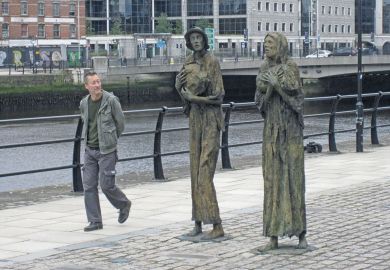Are PhD candidates students, employees or a combination of both? It’s a subject of ongoing debate – and, according to a new study, one that divides the candidates themselves, with factors including subject area and stage of PhD likely to influence how an individual perceives their role.
Researchers at the Vrije Universiteit Brussel (VUB) analysed responses from an institutional survey of PhD candidates and supervisors, with a total sample size of more than 750. Asked whether they considered themselves a student or an employee, more than 51 per cent of PhD candidates considered themselves as fully or mainly an employee, almost 17 per cent saw themselves as fully or mainly a student, while just under a third “felt like they were something in between” the categories, according to findings published in the journal Educational Review.
“The heterogeneity in role perceptions was an interesting finding,” study author Anaïs Glorieux told Times Higher Education. “It confirmed that there is indeed a lot of confusion about what the role of PhD candidates is.”
Candidates who worked as teaching assistants were particularly likely to align with the role of employee, with almost 30 per cent saying they fully considered themselves an employee and 35 per cent saying they mainly saw themselves as such.
The study also indicates a link between discipline and role perception: more than a fifth of PhD candidates in the VUB Doctoral School of Human Sciences fully saw themselves as an employee, as did about 17 per cent of those in the Doctoral School of Life Sciences and Medicine, compared with less than 10 per cent of candidates in the Doctoral School of Natural Science and Bioscience Engineering.
“The high level of independence and ownership that PhD candidates in the humanities tend to have over their project, and the close connection to the professional environment that those in life sciences and medicine often have, might play a role in this,” the authors theorise. In contrast, they add, candidates in natural sciences and engineering may experience “close guidance” and a “hierarchical work environment”, leading them to identify more as a student.
A surprising finding, the researchers note, was the percentage of candidates in the finalising phase of their PhD who said they fully considered themselves a student: 14 per cent, compared with 4 per cent in the executing phase and 0 per cent in the starting phase. “We could expect that the further PhD candidates progress in their trajectory, the more experienced they feel in their field of work and thus the less they feel like a student,” Glorieux said. “However, it could also be argued that these PhD candidates are closer to graduation and are more confronted with the fact that the work they have been doing was to obtain a degree.”
The study authors further highlight a link between role perception and self-efficacy, or a person’s belief that they will be able to complete their goals: respondents who saw themselves fully as students reported the highest levels.
One potential explanation, Glorieux said, was that “candidates who perceive themselves as apprentices who still have a lot to learn display more optimism about eventually reaching their goals, as opposed to those who identify as employees, who might have the feeling that they should already know everything”.
Register to continue
Why register?
- Registration is free and only takes a moment
- Once registered, you can read 3 articles a month
- Sign up for our newsletter
Subscribe
Or subscribe for unlimited access to:
- Unlimited access to news, views, insights & reviews
- Digital editions
- Digital access to THE’s university and college rankings analysis
Already registered or a current subscriber?








